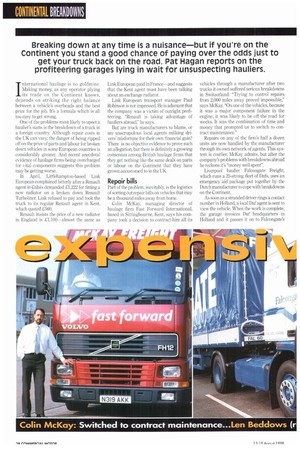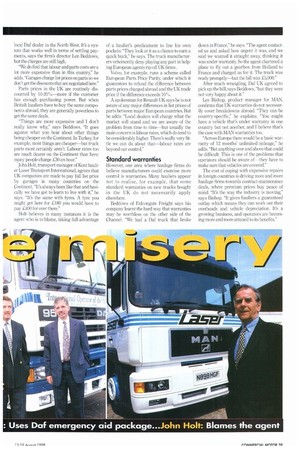Breaking down at any time is a nuisance—but if you're
Page 40

Page 41

If you've noticed an error in this article please click here to report it so we can fix it.
on the Continent you stand a good chance of paying over the odds just to get your truck back on the road. Pat Hagan reports on the profiteering garages lying in wait for unsuspecting hauliers.
1 nternationai haulage is no goldmine. Making money, as any operator plying its trade on the Continent knows, depends on striking the right balance between a vehicle's overheads and the best price for the job. It's a formula which is all too easy to get wrong.
One of the problems most likely to upset a haulier's sums is the breakdown of a truck in a foreign country Although repair costs in the UK can vary, the danger of being ripped off on the price of parts and labour for broken down vehicles in some European countries is considerably greater. And recent anecdotal evidence of haulage firms being overcharged for vital components suggests this problem may be getting worse.
In April, lAttlehampton-based Link European complained bitterly after a Renault agent in Calais demanded £1,222 for fitting a new radiator on a broken down Renault Turboliner. Link refused to pay and took the truck to its regular Renault agent in Kent, which quoted £560.
Renault insists the price of a new radiator in England is 11,100—almost the same as Link European paid in France—and suggests that the Kent agent must have been talking about an exchange radiator.
Link European transport manager Paul Robinson is not impressed. He is adamant that the company was a victim of outright profiteering. "Renault is taking advantage of hauliers abroad," he says.
But are truck manufacturers to blame, or are unscrupulous local agents milking drivers' misfortune for their own financial gain? There is no objective evidence to prove such an allegation, but there is definitely a growing consensus among British haulage firms that they get nothing like the same deals on parts or labour on the Continent that they have grown accustomed to in the UK.
Repair bills
Part of the problem, inevitably, is the logistics of sorting out repair bills on vehicles that may be a thousand miles away from home.
Cohn McKay, managing director of haulage firm Fast Forward International, based in Sittingbourne, Kent, says his company took a decision to contract-hire all its vehicles through a manufacturer after two trucks it owned suffered serious breakdowns in Switzerland, "Trying to control repairs from 2,000 miles away proved impossible," says McKay. "On one of the vehicles, because it was a major component failure in the engine, it was likely to be off the road for weeks. It was the combination of time and money that prompted us to switch to contract maintenance."
Repairs on any of the firm's half a dozen units are now handled by the manufacturer through its own network of agents. This system is costlier, McKay admits, but after the company's problems with breakdowns abroad he reckons it's "money well spent".
Liverpool haulier Fatcongate Freight, which runs a 25-strong fleet of Dafs, uses an emergency aid package put together by the Dutch manufacturer to cope with breakdowns on the Continent.
As soon as a stranded driver rings a contact number in Holland, a local Daf agent is sent to view the vehicle. When the work is complete, the garage invoices Daf headquarters in Holland and it passes it on to Falcongate's local Daf dealer in the North-West. It's a system that works well in terms of settling payments, says the firm's director Len Beddows, but the charges are still high.
"We do find that labour and parts costs are a lot more expensive than in this country," he adds. "Garages charge list prices on parts so we don't get the discounts that are negotiated here."
Parts prices in the UK are routinely discounted by 10-20%—more if the customer has enough purchasing power. But when British hauliers have to buy the same components abroad, they are generally powerless to get the same deals.
"Things are more expensive and I don't really know why," says Beddows. "It goes against what you hear about other things being cheaper on the Continent. In Turkey, for example, most things are cheaper—but truck parts most certainly aren't. Labour rates too are much dearer on the Continent than here: many people charge L30 an hour."
John Holt, transport manager of Kent haulier Laser Transport International, agrees that UK companies are made to pay full list price by garages in many countries on the Continent. "It's always been like that and basically we have got to learn to live with it," he says. "It's the same with tyres. A tyre you might get here for you would have to pay .k.:400 for over there."
Holt believes in many instances it is the agent who is to blame, taking full advantage
of a haulier's predicament to line his own pockets: —They look at it as a chance to earn a quick buck," he says. The truck manufacturers vehemently deny playing any part in helping European agents rip-off UK firms.
Volvo, for example, runs a scheme called European Parts Price Parity, under which it guarantees to refund the difference between parts prices charged abroad and the UK trade price if the difference exceeds 10%.
A spokesman for Renault UK says he is not aware of any major differences in list prices of parts between major European countries. But he adds: "Local dealers will charge what the market will stand and we are aware of the problem from time to time—but usually the main concern is labour rates, which do tend to he considerably higher. There's really very little we can do about that—labour rates are beyond our control."
Standard warranties
However, one area where haulage firms do believe manufacturers could exercise more control is warranties. Many hauliers appear not to realise, for example, that some standard warranties on new trucks bought in the UK do not necessarily apply elsewhere.
Beddows of Falcongate Freight says his company learnt the hard way that warranties may be worthless on the other side of the Channel. "We had a Daf truck that broke down in France," he says. "The agent contacted us and asked how urgent it was, and we said we wanted it straight away, thinking it was under warranty. So the agent chartered a plane to fly out a gearbox from Holland to France and charged us for it. The truck was ready promptly—but the bill was £5,000."
After much wrangling, Daf UK agreed to pick up the bill, says Beddows, "but they were not very happy about it."
Les Bishop, product manager for MAN, confirms that UK warranties do not necessarily cover breakdowns abroad. "They can be country-specific," he explains. "You might have a vehicle that's under warranty in one country but not another, and I believe that's the case with MAN warranties too.
'Across Europe there would be a basic warranty of 12 months' unlimited mileage," he adds. "But anything over and above that could be difficult. This is one of the problems that operators should be aware of ----they have to make sure that vehicles are covered."
The cost of coping with expensive repairs in foreign countries is driving more and more haulage firms towards contract-maintenance deals, where premium prices buy peace of mind. "It's the way the industry is moving," says Bishop. "It gives hauliers a guaranteed outlay which means they can work out their overheads and vehicle depreciation. It's a growing business, and operators arc becoming more and more attuned to its benefits."




































































































